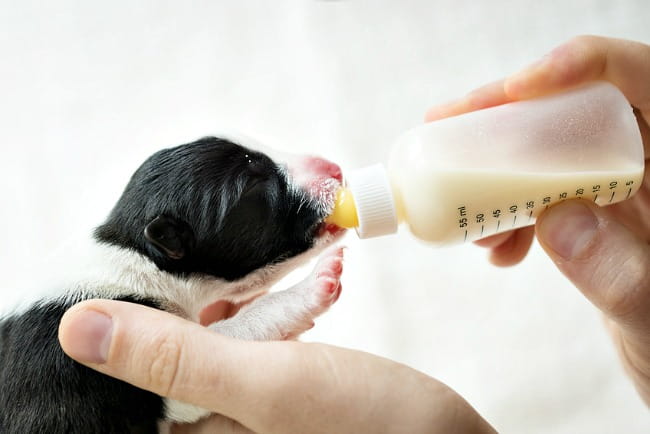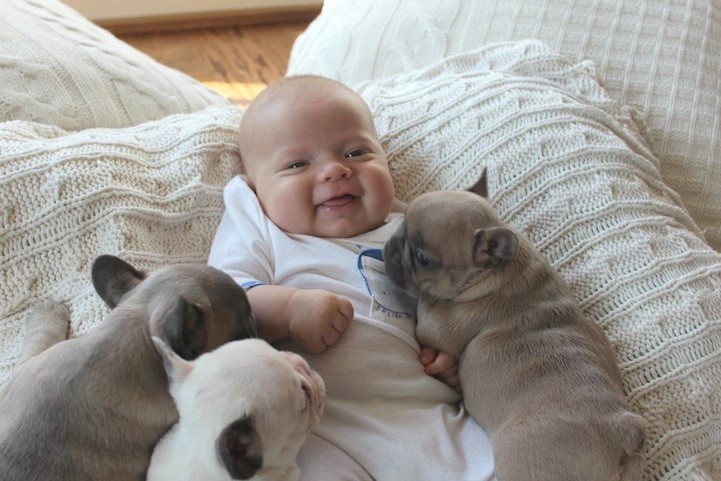Welcoming a litter of newborn puppies into the world is an exciting and joyful experience for any dog owner, but it also comes with a great deal of responsibility. These tiny, vulnerable creatures require close attention and dedicated care to ensure they grow into healthy, happy dogs. The first few weeks of a puppy’s life are critical to its overall development, and understanding how to provide proper care is essential. This article will guide you through the essential steps, from ensuring the puppies are warm and well-fed to monitoring their health and preparing them for their new homes.

The First Few Hours: What to Expect
The first few hours after a puppy’s birth are crucial for its survival and overall well-being. After the puppies are born, it is normal for the mother to clean each one by licking them, which stimulates breathing and helps remove any fluid from their airways. If the mother is struggling or distracted, it’s important to gently intervene, ensuring that each puppy is breathing properly and is warm. In addition to breathing, nursing is another critical step in the newborn’s early hours, as puppies need colostrum from their mother’s milk. This provides essential antibodies to protect against infections.
At this early stage, it’s also important to assess the overall health of the puppies. Healthy newborns will cry, squirm, and instinctively find their way to nurse. On the other hand, puppies that appear weak, fail to nurse, or show difficulty breathing may need immediate veterinary attention. Assisting the mother during this period is sometimes necessary, especially if she is exhausted from labor or if the litter is particularly large.
Creating a Safe and Warm Environment
As newborn puppies are unable to regulate their own body temperature, creating a warm, safe environment is paramount. One of the most common ways to ensure they remain warm is by setting up a whelping box. This box should be located in a quiet, draft-free area of the home where the mother and puppies can rest undisturbed. The box should be large enough for the mother to move around but cozy enough to keep the puppies close to her for warmth.

To maintain a stable environment, it is critical to control the temperature within the whelping box. For the first week, the temperature should be kept between 85°F and 90°F (29°C-32°C). A heating pad placed under a portion of the bedding, or a heat lamp positioned at a safe distance, can help maintain this warmth. As the puppies grow, the temperature can gradually be reduced to 75°F (24°C). Monitoring this temperature regularly and making sure there’s enough space for the puppies to move away from the heat if needed is essential to avoid overheating.
Feeding Newborn Puppies: Ensuring Proper Nutrition
Feeding is a vital aspect of caring for newborn puppies, and the best source of nutrition is their mother’s milk. Nursing provides all the essential nutrients, including antibodies that help build the puppies’ immune systems. Newborns should be nursing every two to three hours, and you can tell they are receiving enough milk if they are gaining weight steadily, sleeping peacefully after feeding, and not crying excessively.

Sometimes, the mother may struggle to produce enough milk, or she may reject some puppies. In such cases, bottle-feeding with a vet-approved puppy formula is necessary. Bottle-feeding requires care and precision, as overfeeding or feeding too quickly can cause choking or aspiration. Feeding sessions should mimic the natural frequency of nursing, around every two to three hours, even during the night. As the puppies approach three to four weeks of age, weaning from milk to solid food can begin, marking an important transition in their growth.
Monitoring Newborn Puppies’ Health
While ensuring that puppies are well-fed and warm is essential, it’s equally important to keep a close eye on their overall health. Newborn puppies are fragile, and their health can change rapidly. One way to monitor their progress is through daily weight checks. Healthy puppies will steadily gain weight, and any sudden loss of weight can be a sign of an underlying problem.
There are several common health issues that newborn puppies might face. Hypoglycemia, or low blood sugar, is a frequent concern in young puppies. Signs include lethargy, trembling, or even seizures. Another issue is dehydration, which can result from insufficient nursing or illness. Checking the puppies’ hydration by gently pulling up the skin at the back of the neck (it should spring back quickly) can help you monitor this.
Newborns are also susceptible to infections, particularly if they were born in unsanitary conditions. Infections might manifest as difficulty breathing, listlessness, or lack of appetite. If any signs of illness arise, contacting a veterinarian immediately is critical, as early intervention can prevent long-term complications. Scheduling an early vet check-up is a good practice to ensure that each puppy is developing healthily and to establish a vaccination and deworming schedule.
Ensuring Proper Socialization and Development
As the puppies grow beyond the initial stages of constant nursing and sleeping, the focus shifts slightly towards their development and socialization. In the first few weeks, it’s important to handle the puppies with care. Gentle handling helps them become accustomed to human touch and builds trust, but too much interference can stress both the puppies and the mother.
Additionally, puppies learn critical social skills from their mother and littermates, such as how to play appropriately and how to interact with others. For this reason, it’s vital to keep the puppies with their mother and siblings for at least eight weeks. Removing a puppy too early can lead to behavioral issues later in life.

Around three to four weeks of age, puppies start exploring their environment. This is the perfect time to introduce them to new stimuli, such as different surfaces, toys, and mild sounds. Introducing these elements gradually ensures the puppies grow into well-adjusted, confident dogs, prepared for life in a human household.
Preparing Puppies for the Transition to a New Home
As the puppies approach the eight-week mark, it becomes time to prepare them for life outside the whelping box. By now, the puppies should be fully weaned and eating solid puppy food. This transition should be done gradually, mixing milk with solid food to create a mash, and slowly reducing the milk content until the puppies are eating solid kibble.
Basic training can also begin at this stage. Simple commands such as “sit” and “come” can be introduced, along with the beginnings of potty training and crate training. Although the puppies are still young, these foundational steps help establish good habits early and make the transition to their new homes smoother.
Before rehoming the puppies, it’s important to ensure they are up to date with vaccinations and deworming. A vet check is essential to make sure the puppies are healthy and ready to move to their new families. Sharing this health information with new owners helps them continue the care and protection of their new pets.
Taking care of newborn puppies is both a rewarding and demanding experience. Ensuring they are warm, well-fed, healthy, and properly socialized sets the stage for a long, happy life. While the first few weeks are filled with constant attention and care, the bond you build with your puppies during this time will last a lifetime. With patience, vigilance, and love, you’ll be able to guide your puppies through their earliest and most formative days, preparing them for a bright future in their new homes.

After 5 years in a high pace business management role, I partnered with an e-commerce developer to start building Dog Supplies Warehouse.
Our number one goal is to make sure all products are managed and delivered to our customers door fast and accurately.
